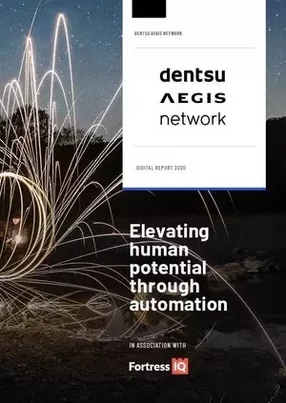Dentsu Aegis: elevating human potential through automation
Dentsu Aegis Network prides itself on being a company with a talent for innovative-thinking and being thoroughly in-tune with the technological zeitgeist. When we last spoke with the global marketing group which operates in over 145 countries, we learned how a highly client-centric approach was defining its mission to introduce digital transformation and lay the foundations for a next-gen way of operating. Despite the discussion occurring at the height of the COVID-19 pandemic, Dentsu Aegis demonstrated the confidence and optimism that only great teams guided by visionary leadership can achieve under such duress. Now, we revisit the company to explore one of the prevailing tech trends in modern business: artificial intelligence (AI) and automation.
Having spent six years (2011 to 2017) as Senior VP and Head of Operations and Technology at iProspect - a wholly-owned subsidiary of Dentsu Aegis - Max Cheprasov took on the role of Chief Automation Officer for Dentsu Aegis Americas in November 2017. Considering himself a “digital native”, Cheprasov says that his transition into the role was a natural one and was a decision guided by a long-term mission: “I transitioned into this new role to focus on acceleration of intelligent automation solutions and to promote best practice across Dentsu globally.” In a career clearly defined by his commitment to finding new and better ways to service clients and enable employees to do their best work, Cheprasov is a believer in going beyond convention and working out cutting-edge tech solutions to everyday problems. “There's always a need for creativity and ingenuity when designing your own unique and differentiated business strategy,” he says. It is this attitude that he brings to bear on his daily activities at Dentsu Aegis.
An early enthusiast of AI’s potential in business, Cheprasov embarked on his first automation-related project in 2016 by experimenting with natural language processing (NLP) and natural language generation (NLG) technology for data analysis reports and insights. It was because of this project that he and Dentsu Aegis’ leadership team became convinced that it was an avenue worth exploring with high priority. Certain that AI could lead to a dramatic boost in business performance and customer experience, Cheprasov established an eight-year road map (2017 to 2025) and the company formally established the Dentsu Aegis Automation Centre of Expertise (CoE). “Today, we have over 400 people engaged with the CoE as part of our global community of automation champions and experts. But, as far as I'm concerned, this is still only the beginning; the future of automation should be placed in the hands of every single employee,” he states. With the goal of making teams as efficient, productive and happy as possible, the CoE functions to optimise the working lives of a company’s employees. Capable of augmenting workloads by automating a boring or repetitive task, Dentsu Aegis can help mitigate or eliminate the laborious strain caused by routine tasks, approval turnarounds and bottlenecks. “We can automate a process end-to-end and give that time back to employees to handle more critical tasks that cannot be automated, such as creative, critical, strategic thinking, complex problem solving and more. Our mission is to elevate human potential,” says Cheprasov.
Of course, this aim would be very difficult without a suitably agile workforce behind the scenes at Dentsu Aegis, and this is exactly what Cheprasov says the company has. “I think we have a unique workplace culture. One word to describe everybody in the business, across 65,000 professionals, is that we’re ‘entrepreneurial’ by the nature of how we've grown.” Having expanded rapidly over the last five years due to a fast-paced M&A (mergers and acquisitions) strategy, the company has continually rejuvenated itself by incorporating the trend-setting new ideas of the startups and other firms it has acquired. “We operate without borders and limitations as one enterprise across 145 countries, where highly collaborative teams of highly intelligent, optimistic and passionate people are working together and willing to take calculated risks to achieve impressive results for Dentsu Aegis and our clients,” he continues. Indeed, with over 150 acquisitions made and a growing capacity for innovation, talent and scale, Cheprasov’s observation that “there’s no future in staying the same” certainly rings true.
As well as its robust internal collaboration, Dentsu Aegis also prides itself on working well with other companies which share its vision and mission. With regard to the company’s pursuit of automated superiority, Cheprasov highlights FortressIQ, Catalytic and UiPath as essential partners: “We used Catalytic’s AI-enabled platform to design an automated RFP (request for proposal) workflow, in combination with NLP and ML (machine learning). As a result, we reduced the time it takes to compile the initial draft of the response from two weeks to just several minutes. Our most recent project with UiPath required a deeper partnership with their Professional Services group, as we needed to temporarily add 10 RPA (robotic process automation) experts to our team to help us build 60 bots in six weeks. As a result, the software bots have automated 157,000 hours of work during their first deployment, completing over 600,000 tasks. Finally, FortressIQ helps us accelerate process mining and process discovery, exponentially improving our ability to identify new use-cases for automation and process reengineering. Additionally, the time and motion analyses led to improved SOPs, compliance and training. Using FiQ’s artificial neural network (ANN), NLP, and ML models, in combination with advanced computer vision (OCR), we automatically mined, modelled and documented data for over 2,200 processes in five months with just two people operating the system.”
Founded in 2017, FortressIQ is the creator of a cognitive automation platform which is capable of accelerating digital transformation through a combination of ANN, NLP and ML, as well as OCR. Able to quickly grasp the fundamentals of a business’ operations, the platform enables the collection of swift insights which can be used in the development of an automation strategy.
Commenting on the relationship that Dentsu Aegis shares with FortressIQ, Cheprasov praises the company’s technology and states that without its partnership “it would have taken over 30 business analysts to gather the same level of detail and insight that [FortressIQ’s] AI was able to capture if it was done manually. “
Founder & CEO: Pankaj Chowdhry
On the subject of automation, Cheprasov is evangelical about its growing importance, not only for Dentsu Aegis but for its clients and modern business generally. “Automation is just a natural evolution from operational excellence,” he explains. “Traditional operational workflows are no longer sustainable; the workforce is changing rapidly, yet very few global companies are ready to manage their workforce with people, bots and AI working side by side.” He asks every company to consider the subject of advancing technology seriously; it is an aspect of business which is both exciting and intimidating - staying on top of it and processing the large amounts of data accessible requires automation integrated into every process. It was because of this that Cheprasov formulated his seven-year roadmap. “It's in response to client demands for higher levels of agility and consistent operational excellence,” he explains. As such, Dentsu Aegis plans to go beyond traditional forms of automation (AI, ML, RPA, etc) to fulfil its quest for ever-greater heights of operational efficiency. This brings the conversation back to the importance of collaborating with startups in the sector: “We continue to monitor who the emerging players are; there's a lot of new startups that have fantastic ways of applying AI to different problems in business,” he says.
When considering the future, not just of Dentsu Aegis but also automation generally, Cheprasov identifies two key trends: hyperautomation and the democratisation of AI. The former, a term with Industry 4.0 connotations, imagines an operational state which combines digitisation with connectivity and AI to create a supremely automated system capable of seamless interoperability; regarding the latter, he adds this: “The future of automation should be placed in the hands of every employee, giving them access to low-code or no-code platforms and providing the necessary training and support.” This, Cheprasov anticipates, will lead to unprecedented efficiency gains for workers and unlock the human potential in a way which was unfeasible previously. As the post-COVID-19 world continues to make companies re-examine their relationship with technology, Dentsu Aegis is already expanding into the less overt considerations that furthering automation entails, such as its CSR activities with AutonomyWorks. “Their goal is to create new job opportunities for individuals with autism and similar disabilities. At Dentsu, we recognise society as one of our key stakeholders and one of our key objectives right now is to upskill the organisation’s workforce with the necessary automation skills to accelerate the work that they currently do for their clients.”
Considering what the rest of 2020 might hold for Dentsu Aegis, Cheprasov summarises its goal as continuing to help its clients win, keep and grow their own customer bases. If the COVID-19 disruption has taught the company anything, it’s that close collaboration, an agile mindset and an innovative attitude will help Dentsu Aegis navigate the lingering aspects of disruption, which, in turn, will help its clients. “Every business today needs to have an AI and automation strategy and plan,” Cheprasov concludes. “By 2025, AI-powered companies will be 10 times more efficient and hold twice the market share over organisations that fail to embrace the technology today. I think we have reached a point in the evolution of intelligent automation when you can no longer delay this decision.”



- Sustainable Procurement at Dentsu USProcurement Strategy

